Category: Care
Digitalize in Stockholm 2023 – Poster Presentation
Today I gave a poster presentation of my postdoctoral research project at Digitalize in Stockholm 2023. As its only my second month on the new job, the poster is focused on a general overview and two projects I’ve recently begun: Seasonal Craft Implosions (on the poster called A Year of Seasonal Crafts) and Toying with Relations. I had some really lovely conversations regarding taking children (and play) seriously and explorative research methods.
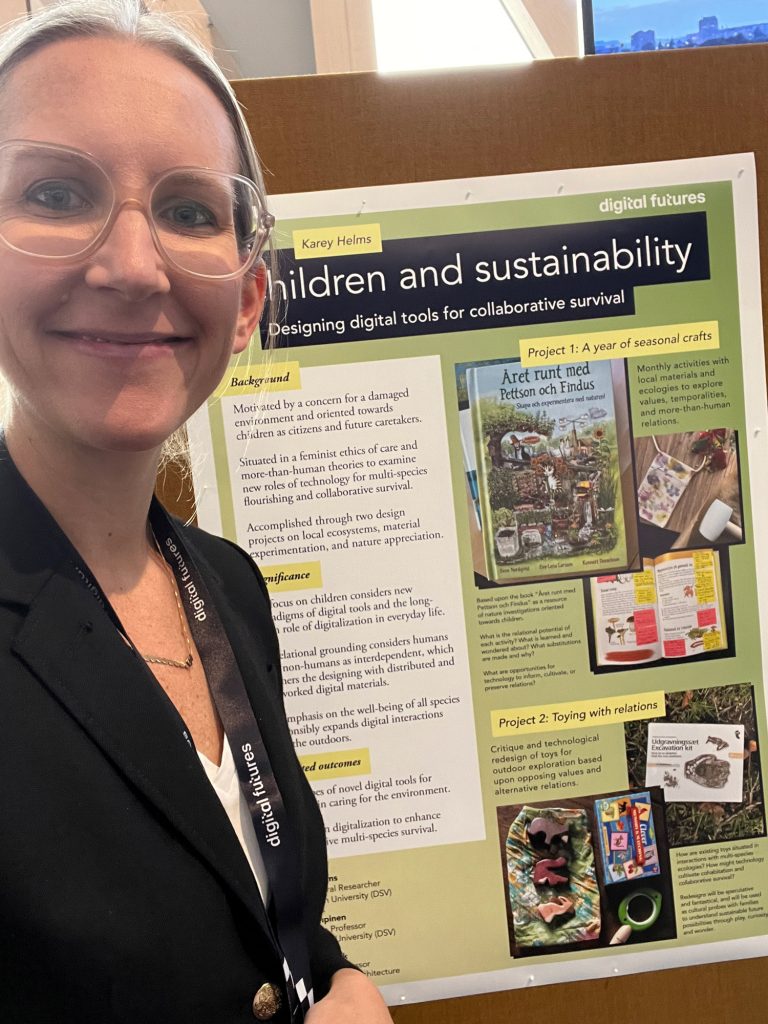
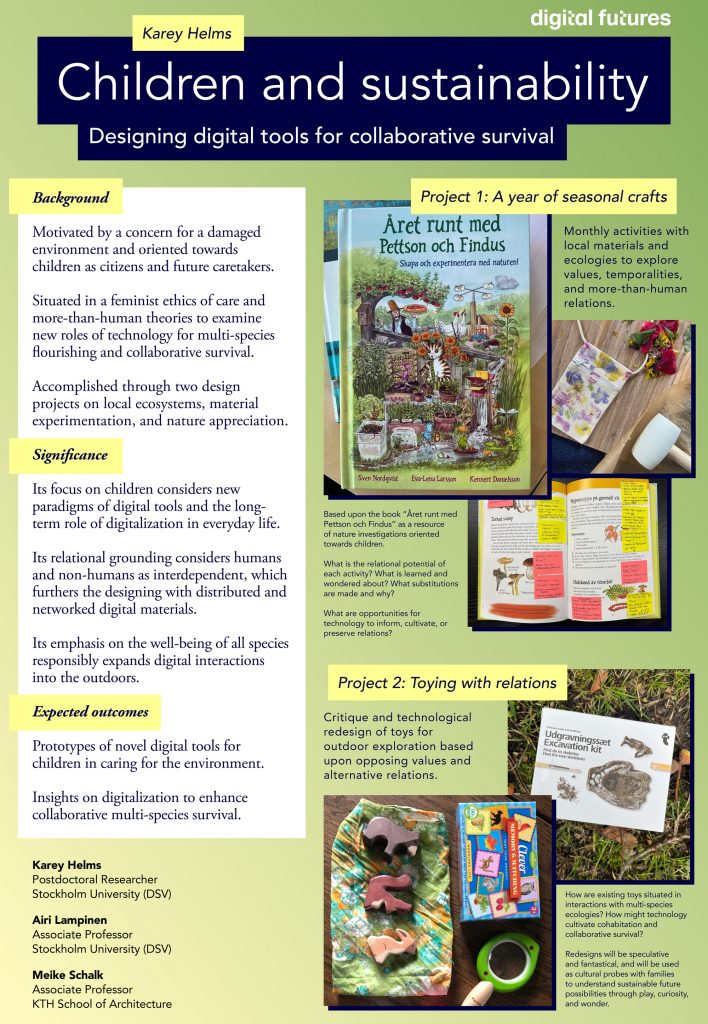
Digital Futures Postdoc Fellowship
Last year I was awarded a digital futures postdoctoral fellow position, which due to parental leave for my second child, I will begin on August 15th, 2023 at Stockholm University. I will be working with Airi Lampinen (Stockholm University) and Meike Schalk (KTH Royal Institute of Technology) on the project Children and sustainability: Designing digital tools for collaborative survival.
About the project
My research will investigate children and digitalization for more sustainable futures. It draws upon a feminist ethics of care and more-than-human theories of collaborative survival to examine new roles of technology in and for multi-species flourishing. This will be done through design-based activities (i.e. research-through-design) that will be situated around topics such as human-waste relations, local ecosystems, and nature appreciation.
Background
This research is motivated by a concern for a damaged environment and is oriented towards children as inhabitants and caretakers of its future. It is significant for the following reasons. Firstly, its focus on children is significant in considering new paradigms of digital tools and the long-term role of digitalization in everyday life. Secondly, its relational grounding within theories of care provides a lens to consider humans as interconnected with non-humans, which is important in developing understandings of designing with distributed and networked digital materials. Thirdly, its emphasis on nature as critical to the health and wellbeing of all species situates an important and often overlooked context for digitalization, which is significant in responsibly expanding digital interactions into the outdoors and nonurban environments.
Dr. Helms
What a privilege on Monday to have my doctoral work presented by Laura Forlano, and deeply engaged with by her and committee Danielle Wilde, Elvin Karana, and Carl DiSalvo (and Martin Avila). Elated, exhausted, overwhelmed, overjoyed, tired, and energized are just a few of the ways I feel. So thankful for the incredible support from everyone near, far, in person, and online. ~ Dr. Helms
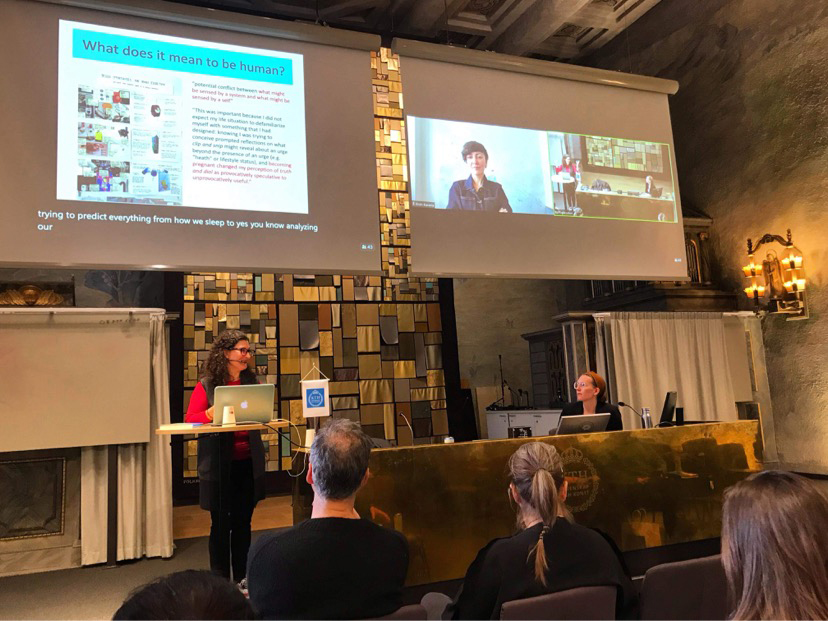
PhD defense!
On Feb 6th 13.00, I’ll be taking a brief intermission from parental leave 👶 to defend my thesis “Designing with care: Self-centered research for interaction design otherwise” ✨ Welcome to join: Kollegiesalen, Brinellvägen 8, Stockholm or on Zoom (https://kth-se.zoom.us/j/67699289253). Abstract below and PDF here!
Opponent: Laura Forlano
Committee: Danielle Wilde, Carl DiSalvo (virtual), Elvin Karana (virtual), Martin Avila
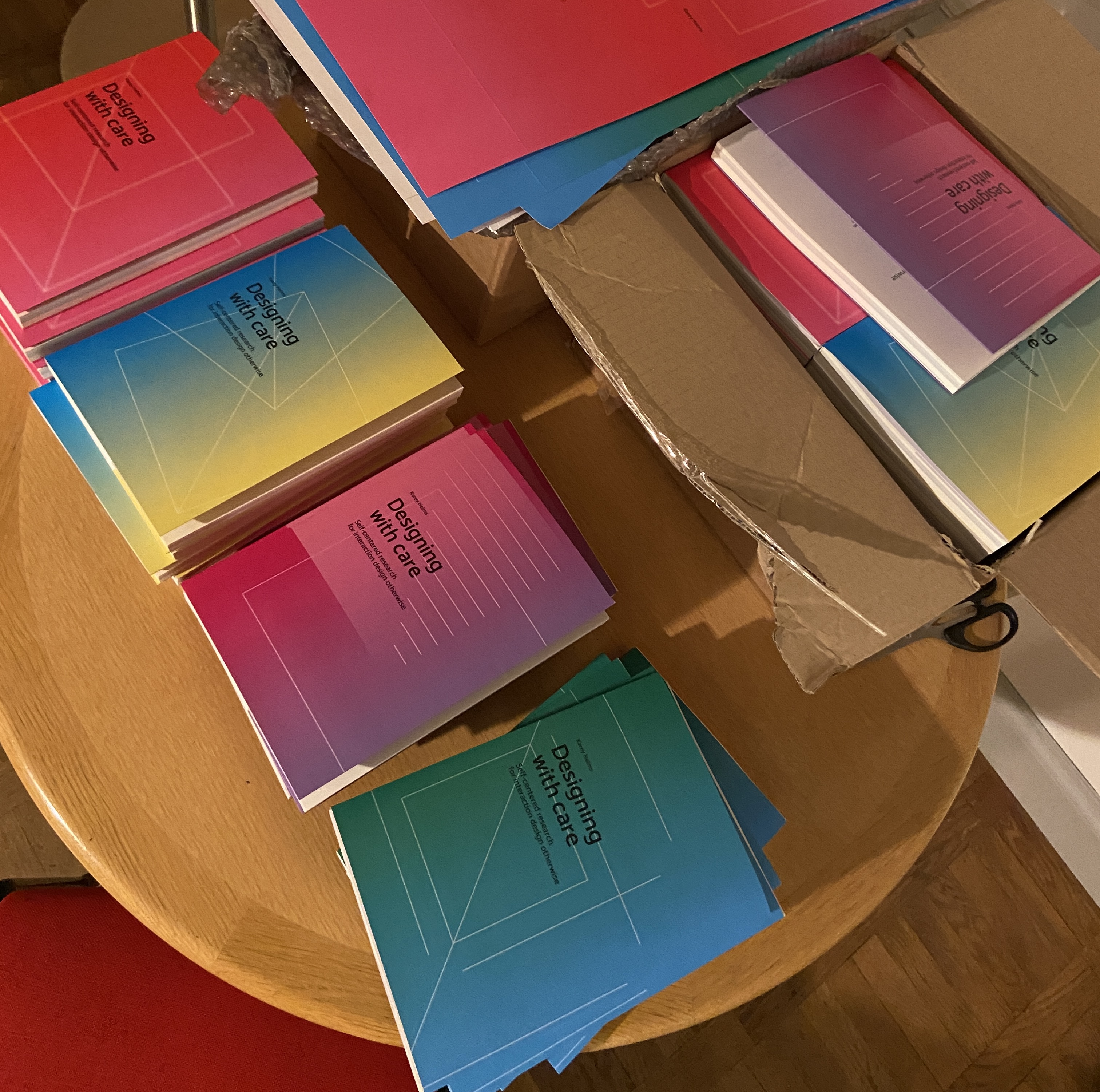
Designing with care: Self-centered research for interaction design otherwise
This dissertation is about the research program designing with care as a pathway towards interaction design otherwise amid a world in crisis. Considering how established ways of doing interaction design will change involves recognizing the role of digital materials in social injustice and systemic inequality. These concerns are inseparable from the material complexity of interactive experiences and their more-than-human entanglements in care. Through five design experiments, I explore everyday human care as wickedly attending to some care doings and not others, and an intimate and generous questioning of oneself as human.
I offer four contributions for interaction designers and design researchers. The first contribution is designing with care. This research program draws upon care ethics and posthumanism to establish four axioms: everyday, wickedness, intimacy, and generosity. Within this programmatic framework, the second contribution is definitions of wickedness and generosity as ethical stances that can be taken by designers and researchers. The third contribution is the synthesis of my four methodological approaches: auto-design, spatial orientations, leaky materials, and open speculations. Each is a generative and analytical pathway towards more sustainable and just futures. The fourth contribution is five careful designs as prototypes of what interaction design otherwise might be like: technologies of human waste, spying on loved ones, leaky breastfeeding bodies, scaling bodily fluids, and a speculative ethics.
From my research program and contributions, I discuss disciplinary resistances to suggest three possibilities for how I argue interaction design should change: engaging with mundane yet unrecognized topics, doing design work where the consequences would be present, and reconsidering how the formats of research publications could better reflect positionality. I then reflect upon the relevancy of self-centered research in moving beyond oneself for more sustainable worlds.
CHI 2022 – Publications
A little over a week ago, I had two papers published at the ACM CHI conference and a position paper shared at the workshop Feminist Voices about Ecological Issues in HCI. Check them out!
Karey Helms. 2022. A Speculative Ethics for Designing with Bodily Fluids. ACM Conference on Human Factors in Computing Systems Extended Abstracts (CHI 2022, alt.chi) New Orleans, LA, USA.
PDF, DOI, Video (8 min), Video (30 sec)
Pedro Sanches, Noura Howell, Vasiliki Tsaknaki, Tom Jenkins, and Karey Helms. 2022. Diffraction-in-action: Designerly Explorations of Agential Realism Through Lived Data. ACM Conference on Human Factors in Computing Systems (CHI 2022), New Orleans, LA, USA. (Best Paper Honorable Mention Award)
DOI, Video (8 min), Video (30 sec)
Karey Helms. 2022. Site-writing around Breastfeeding. ACM Conference on Human Factors in Computing Systems (CHI 2022, Position paper) Workshop “Feminist Voices about Ecological Issues in HCI”, New Orleans, LA, USA.
PhD 90% Seminar
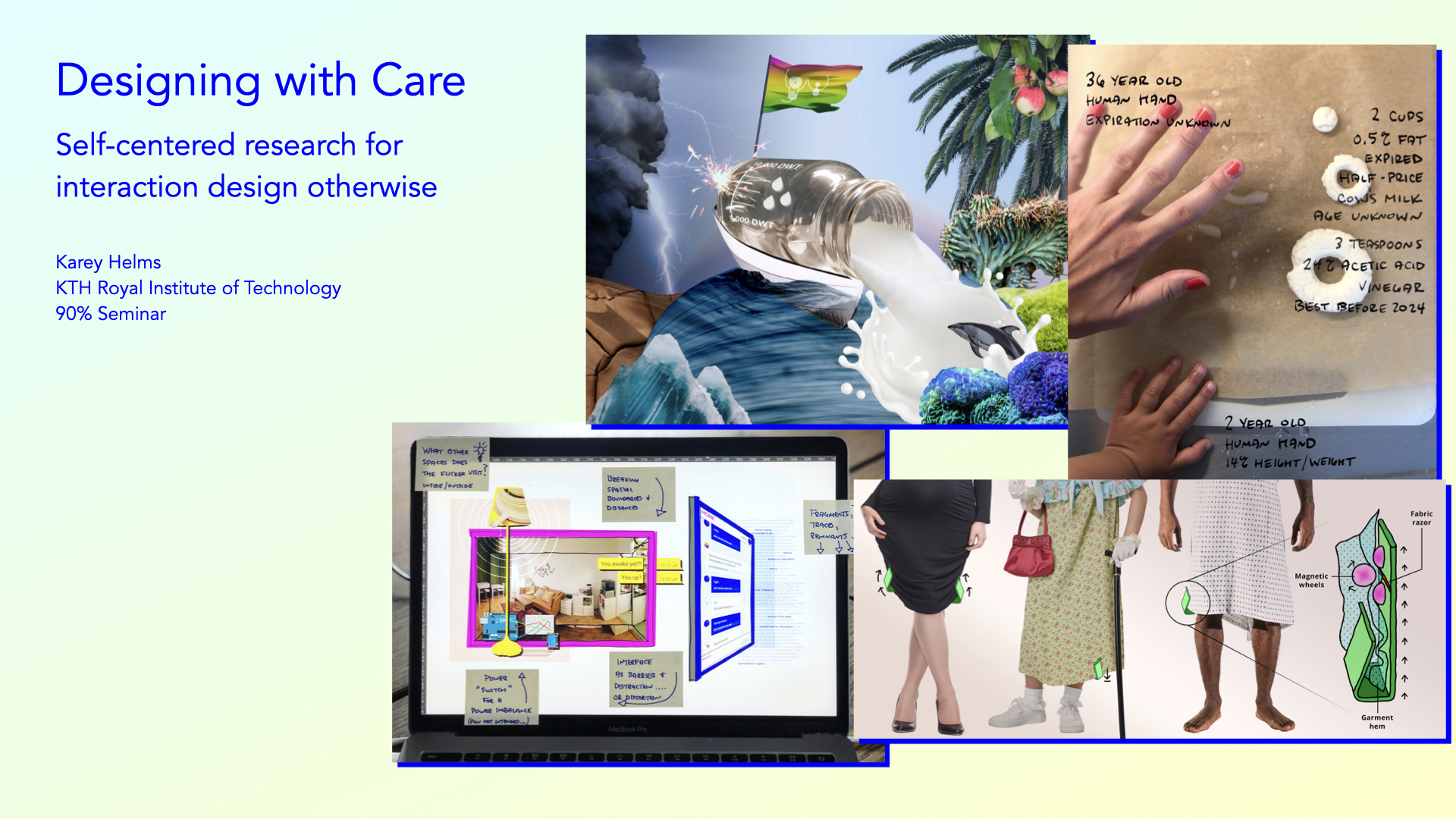
This week I had my 90% (“final”) seminar with Heather Wiltse from Umeå Institute of Design. I’m very appreciative of her engagement with my work and difficult questions that energized me for my next few months of writing. The tentative title and abstract of my thesis below:
Designing with care: Self-centered research for interaction design otherwise
This dissertation is about the research program designing with care as a pathway towards interaction design otherwise amid a world in crisis. Considering how established ways of doing interaction design will change involves recognizing the role of digital materials in social injustice and systemic inequality. These concerns are inseparable from the material complexity of interactive experiences and their entanglements in care. Through five design experiments, I explore wickedly attending to human everyday care, and an intimate and generous questioning of oneself.
I offer four contributions for interaction designers and design researchers. The main contribution is designing with care. Within this programmatic framework, I contribute extended articulations of wickedness and generosity. The third contribution is the synthesis of four methodological approaches: auto- design, spatial orientations, leaky materials, and open speculations. Each is a generative and analytical pathway towards five careful designs as prototypes of what interaction design otherwise might be like: technologies of human waste, spying on loved ones, leaky breastfeeding bodies, scaling bodily fluids, and a speculative ethics. From these, I discuss disciplinary resistances and personal struggles to reflect upon implicating oneself within more-than-human care, and consider the benefits and limitations of designing with care in moving beyond self-centered research towards more sustainable worlds.
Nordes 2021 – Exploratory Paper
Had a wonderful time this week (virtually) attending my first Nordes conference! In addition to attending the wonderful workshop Life Stories for Collaborative Survival, I also presented the exploratory paper Scaling Bodily Fluids for Utopian Fabulations, a design collaboration with Marie Louise Juul Søndergaard and Nadia Campo Woytuk. Slide GIF below. Very much hope to attend future Nordes conferences!
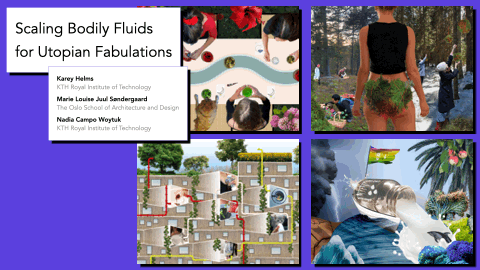
DIS 2021 – Awards
This week I “presented” a full paper and pictorial at the 2021 ACM Designing Interactive Systems (DIS) conference – 10 minute pre-recorded video presentations below – and excited doesn’t quite capture how it feels to share that Entangled Reflections on Designing with Leaky Breastfeeding Bodies received a Special Recognition for Diversity & Inclusion, and Troubling Care: Four Orientations for Wickedness in Design received a Best Paper Honorable Mention Award.
Entangled Reflections on Designing with Leaky Breastfeeding Bodies, DIS 2021
Troubling Care: Four Orientations for Wickedness in Design, DIS 2021
DIS 2021 – Accepted Paper and Pictorial
Excited to have two publications accepted to the 2021 ACM Designing Interactive Systems (DIS) conference: Troubling Care: Four Orientations for Wickedness in Design (paper with Ylva Fernaeus) and Entangled Reflections on Designing with Leaky Breastfeeding Bodies (pictorial).
Troubling Care: Four Orientations for Wickedness in Design
Karey Helms & Ylva Fernaeus
Tensions in designing for care are often positioned as conflicts to be resolved. We draw upon queer theories to investigate caring for loved ones as not “in-line” with normative expectations of care as positive and fulfilling. Through the critique of two autobiographical design projects designed for informal, everyday care of our families, we describe four troubling orientations of care: willful detours, selfish shortcuts, naughty invasions, and unhappy departures. From these, we argue that tensions in care may not always be designed against, but can also be desired and generative.We conclude by discussing a “wickedness” in caring for loved ones that problematizes in-home technologies as attractively naughty and potentially violent, and the four orientations as resources for interaction designers to spatially navigate tensions of domestic care.
Entangled Reflections on Designing with Leaky Breastfeeding Bodies
Karey Helms
Bodily transformations that attend breastfeeding include entanglements of more-than-human materials and agencies. These can be seen in exchanges of physical matter, such as bacteria, that blur bodily boundaries. I present three design explorations of my breastfeeding experiences as entangled: knitting bras for lopsided breasts, transforming milk into fiddling necklaces, and site-writing around breastfeeding. Through spatial and conceptual mappings of the explorations, I propose them as alternative narratives in designing for leaky breastfeeding bodies. I also offer two broader reflections on designing with, for, and among more-than-human bodily materials: generous absence and bodily mappings. The accompanying reading instructions to this bodily research open for further encounters and reflections between the three explorations.
KTH 2020 IxD Team Exhibition
A couple weeks ago, the Interaction Design team at KTH had an internal exhibition of design projects. Due to the pandemic, whereby we primarily work from home, it has been difficult to engage with each other’s design work. Thus, this exhibition was a chance for us to get together (in line with safe distancing) to share our work! I presented a new side project within my PhD that I started while on maternity leave last year, which I call Free the Nipple. Below are some images of my exhibition space and a draft project description. You can find more of the project’s process (and other project work) on my public instagram account.
PhD 50% Seminar
Last Wednesday I had my 50% PhD seminar! Sill processing the feedback from my opponent Lone Koefoed Hansen who Zoomed in from Aarhus University, but very thankful for an inspiring discussion.
A short overview of my research can be found here Careful Design: Implicit Interactions with Care, Taboo, and Humor. And an even shorter snapshot of 2.5 years in 16 seconds:
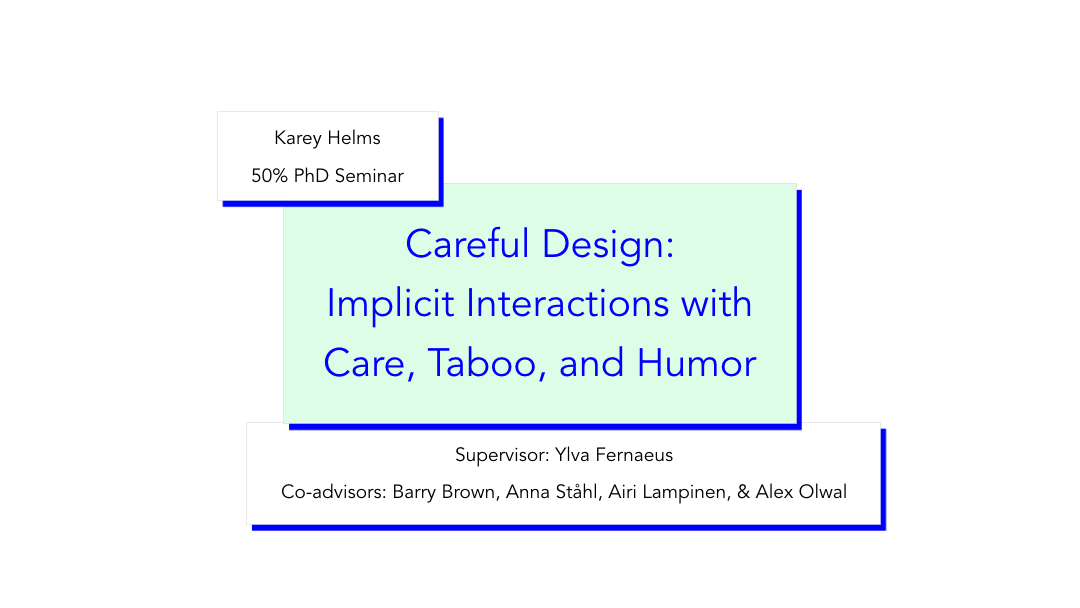
DIS 2020 – Accepted Doctoral Consortium Proposal
Having only recently returned to work full-time in March from ten months of parental leave, and despite working from home rather than in the lab due to COVID-19, it has felt wonderful to re-engage with my research with new energy and focus. Even more rewarding was to recently find out that my Doctoral Consortium proposal was accepted to DIS 2020. Very much looking forward to discussing my work with the Chairs and other participants – even if most likely virtual! Below is my title, abstract, and a link to the pre-print.